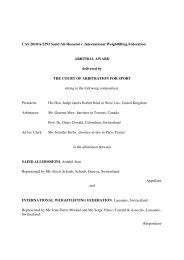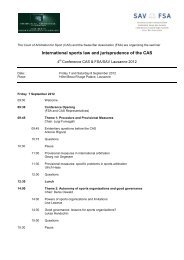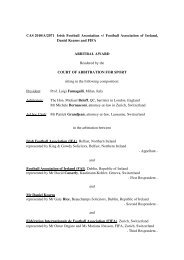(CAS) Bulletin - Tribunal Arbitral du Sport / TAS
(CAS) Bulletin - Tribunal Arbitral du Sport / TAS
(CAS) Bulletin - Tribunal Arbitral du Sport / TAS
You also want an ePaper? Increase the reach of your titles
YUMPU automatically turns print PDFs into web optimized ePapers that Google loves.
had stated that his claim had been lodged with FIFA before<br />
the matter was referred to the relevant instance in Israel and<br />
that the aforementioned allegation had not been denied by the<br />
[Player] <strong>du</strong>ring the course of this proceeding, as well as taking<br />
into account art. [4.]28 of the Contract which explicitly allowed<br />
the parties to have recourse to FIFA’s decision-making bodies<br />
in case of a dispute between them, the Single Judge decided<br />
that he was competent to decide on the present matter. This<br />
established, the Single Judge recalled that in accordance with the<br />
provisions set out by both the 2001 and 2008 edition of the<br />
FIFA Players’ Agents Regulations, FIFA has jurisdiction<br />
on matters relating to licensed players’ agents, i.e. on those<br />
indivi<strong>du</strong>als who hold a valid players’ agent license issued by<br />
the relevant member Association. Consequently, and since the<br />
present matter concerned a dispute between a players’ agent<br />
licensed by the Israel Football Association and a Ghanaian<br />
player, regarding an alleged outstanding commission, the Single<br />
Judge held that he was thus competent to pass a decision in the<br />
case at hand which had an international dimension ”.<br />
On the merits, the Single Judge of the FIFA-PSC<br />
considered that (i) “ he was not satisfi ed that the evidence<br />
provided by the Claimant was suffi cient to corroborate the fact<br />
that his involvement was crucial to the signing of the employment<br />
contract in question” , (ii) “ nor had it been proven that another<br />
agent had been involved in the negotiations leading to the<br />
signature of the employment contract [and] it could therefore<br />
not been concluded that the Respondent had breached any of the<br />
terms of the representation contract ”, and (iii) “t he percentage<br />
of commission <strong>du</strong>e was clearly abusive since it disproportionately<br />
favoured the Claimant to the detriment of the Respondent”.<br />
As a consequence, the Single Judge of the FIFA-PSC<br />
rejected on the merits the Agent’s claim and ordered<br />
him to pay to the Player the costs of the proceedings.<br />
On 7 April 2010, pursuant to Article R47 of the Code<br />
of sports-related arbitration (the “<strong>CAS</strong> Code”), the<br />
Agent fi led an appeal with the <strong>CAS</strong> to challenge the<br />
decision adopted by the Single Judge of the FIFA-<br />
PSC on 26 June 2009 and notifi ed with grounds to<br />
the parties on 17 March 2010.<br />
On 12 August 2010, the <strong>CAS</strong> Court Offi ce<br />
communicated to the parties the Panel’s decision to<br />
grant the Appellant the possibility to comment on<br />
the issues of res judicata and FIFA’s jurisdiction, raised<br />
by the Respondent in his Answer fi led on 1 July 2010.<br />
On 15 October 2010, the <strong>CAS</strong> Court Offi ce<br />
communicated to the parties the Panel’s decision to<br />
bifurcate the case and to decide on a preliminary basis<br />
the issues of res judicata and FIFA’s jurisdiction. By the<br />
same communication, the parties were also asked to<br />
fi le a further written submission to state their opinion<br />
as to whether the IFA award would be recognizable<br />
or not in Switzerland under Swiss law and the UN<br />
Convention on the Recognition and Enforcement of<br />
Foreign <strong>Arbitral</strong> Awards of 10 June 1958 (the “ New<br />
York Convention ”).<br />
On 31 January 2011, the <strong>CAS</strong> communicated to the<br />
parties the Panel’s decision to hold a hearing on<br />
the preliminary issues. The hearing took place in<br />
Lausanne on 8 April 2011.<br />
Extracts from the legal fi ndings<br />
A. The preliminary objections raised by<br />
the Respondent<br />
The essence of the Respondent’s preliminary<br />
objections is that the <strong>CAS</strong> may not entertain the merits<br />
of this case because the same matter has already been<br />
heard and decided by an Israeli arbitral tribunal with<br />
a binding award which has been confi rmed by the<br />
competent Israeli state courts and has thus become<br />
fi nal. It is a typical res judicata exception.<br />
In addition, the Respondent argues that the FIFA<br />
Single Judge erred in hearing and adjudicating the<br />
case because it should have deferred to the Israeli<br />
arbitral tribunal, either because it did not have<br />
jurisdiction in the fi rst place or because, if it did<br />
have a parallel jurisdiction, it should have declined<br />
to render a decision once the Israeli arbitrator had<br />
rendered his award.<br />
The Panel will address the issue of res judicata fi rst<br />
because, should such claim be upheld, there would be<br />
no need to ascertain whether the FIFA Single Judge<br />
had to decline to adjudicate the matter.<br />
As a preliminary consideration, the Panel notes that<br />
it is discussed in the legal literature whether a wellfounded<br />
exception of res judicata implies the lack of<br />
jurisdiction or the inadmissibility of the claim. In<br />
either case, the practical result would be the same,<br />
as the Panel would be prevented from dealing with<br />
the merits of the case. Indeed, in the Final report on res<br />
judicata and arbitration of the International Commercial<br />
Arbitration Committee of the International Law<br />
Association (“ ILA ”), the following can be read: “ In<br />
this respect, the Committee does not express an opinion as to<br />
the question whether preclusive effects of a prior arbitral award<br />
go to jurisdiction or to admissibility. Jurisdictions give different<br />
answers to this question and the Committee prefers to leave this<br />
question to the applicable law. On the other hand, the question<br />
is to a large extent moot since under both characterizations a<br />
preclusion defense is to be raised early in proceedings ” (ILA,<br />
International Commercial Arbitration Committee,<br />
Toronto Conference [2006], para. 68, in www.ila-hq.<br />
org/en/committees/index.cfm/cid/19).<br />
Jurisprudence majeure / Leading cases<br />
-<br />
68





